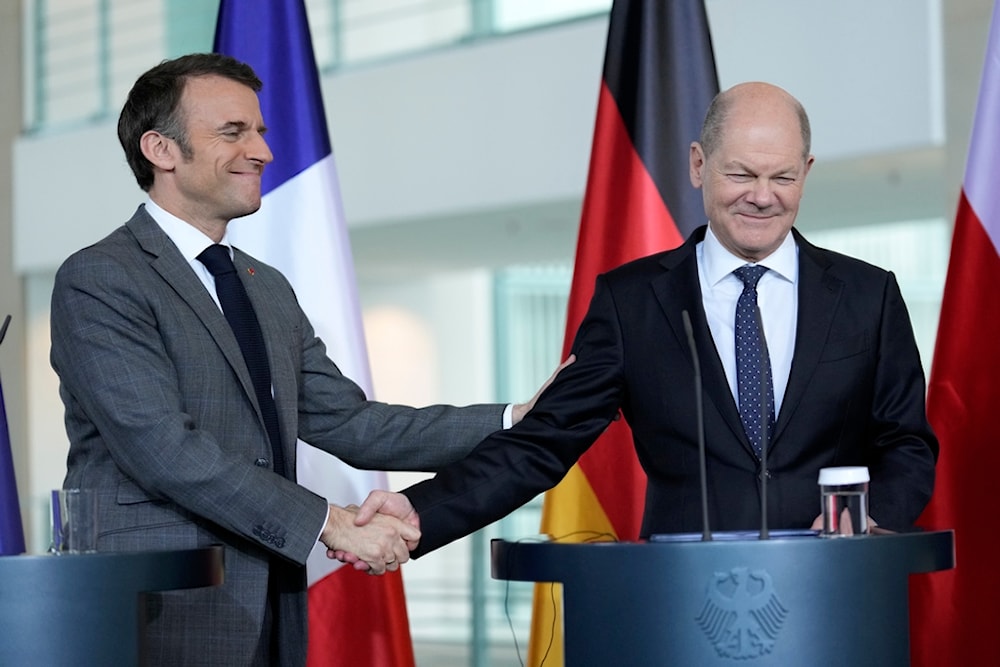Interest from Russian assets to be spent on Ukraine arms: Scholz
Of the sum seized by Euroclear, which roughly accounts to €191 billion ($205 billion), the funds have accrued over €4.4 billion in interest over the past year.
-

German Chancellor Olaf Scholz, right, and French President Emmanuel Macron reacts at a press conference in Berlin, Germany, Friday, March 15, 2024. (AP)
German Chancellor Olaf Scholz on Friday announced that interest accrued from frozen Russian assets will be used to purchase arms for Kiev.
Western countries hold about $300 billion of funds belonging to the Russian Central Bank. Of the sum seized by Euroclear, which roughly accounts to €191 billion ($205 billion), the funds have accrued over €4.4 billion in interest over the past year.
"We will use windfall profits from Russian assets frozen in Europe to financially support the purchase of weapons for Ukraine," Scholz said at a joint press conference with counterparts French President Emmanuel Macron and Polish Prime Minister Donald Tusk in Berlin.
He further unveiled plans to establish a "new capability coalition for long-range rocket artillery," with procurement intended to occur "on the overall world market."
Scholz refrained from offering more details, leaving uncertainty regarding whether he was alluding to a completely new initiative or to a "long-range" plan previously announced by President Macron in February.
Read more: Russian economy immune to sanctions: The Economist
Last month, European Commission President Ursula von der Leyen proposed utilizing interest from frozen Russian assets to purchase weapons for Ukraine. However, some EU members, namely Malta, Luxembourg, and Hungary had "voiced reservations" about the plan earlier this week, as per Politico.
Russia has previously stated that such measures constitute "economic racketeering," noting that the seizure and transfer of Russian funds to Ukraine would be considered a breach of international law.
Dollar dominance hanging by a thread
Approximately $300 billion in Russian securities and cash have been frozen by the EU, G7 nations, and Australia, with the majority held in the EU. While there was a belief that these funds should remain inaccessible to Russia unless it assists in Ukraine's reconstruction, there was disagreement over the legality of outright asset seizure.
To resolve this dispute, they sought guidance from a team of ten international law experts and practitioners, who unanimously affirmed in a joint letter on February 21 that the seizure of assets is entirely legal, citing Russia's ongoing special military operation in Ukraine.
"We have concluded that it would be lawful, under international law, for States which have frozen Russian State assets to take additional countermeasures against Russia, given its ongoing breach of the most fundamental rules of international law, in the form of transfers of Russian State assets as compensation for the damage that has resulted directly from Russia’s unlawful conduct," the experts in the letter, which was obtained by Bloomberg.
A day after the letter was issued to Western leaders, the International Monetary Fund (IMF) warned that plans to seize frozen Russian assets could pose a significant threat to the global monetary system and entail unforeseen risks.
"From our perspective, it is important that any actions have sufficient legal underpinnings to avoid potential risks, and these include risks of litigation, risks of countermeasures, and risks to the international monetary system," IMF spokesperson Julie Kozack told reporters.
Read more: Yellen says unfreezing Russia funds risks global financial stability

 3 Min Read
3 Min Read










